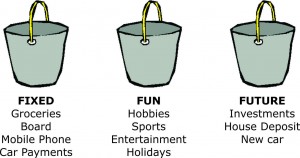Financial literacy is one area that is not widely taught at school but is definitely required for everyday living.
If you have a teenager who has just begun part time work and would like to get them considering how best to manage their money, then ensure you read the below and next week’s blog “A Good Start in Life“.
Income splitting into 3 expense categories
The Three Buckets Approach
- Fixed Costs: Help them understand their fixed expenses, such as mobile phone bills or other regular obligations. Right from the start, learning to allocate money for fixed costs sets a responsible precedent.
- Fun: Encourage them to set aside a percentage for leisure activities like going to the movies or having lunch with friends.
- Future: Discuss long-term goals. For instance, buying a car before leaving school can be a significant objective. Guide them to determine what portion of their earnings they want to save towards this goal.
In Maddie’s case, she has just turned 15 and started her first part time job working at McDonalds 2 nights a week. She earns in the hand $100 per week and would like to consider saving for a vehicle, but would also like to have some money to go to the movies or out for lunch with her friends.
The only fixed cost she has to date is the cost of her mobile phone which is $20 per week. The remaining $80, she would like to put $30 per week away for Fun and the remaining $50 per week to saving for a vehicle.
If Maddie was to continue to save $50 per week for the next 3 years and receive a return of at least 3% via her internet banking account then she would have $8,160 (today’s dollars) to spend on a vehicle at age 18.
Seems pretty simple in theory but for many these fundamental principles of saving for a future goal can be hard to put in practise and the principal of bucketing these savings into another bank account might just help to keep the focus on the end goal.
Key Takeaways:
- Financial literacy is crucial for everyday living and having an understanding of the basics is important.
- Teach your teenagers the importance of income allocation: Fixed Costs, Fun, and Future – “Bucketing Approach.”
Incorporating these fundamental financial principles will empower your teenager to make smart money decisions, setting them on a path of responsible financial management for years to come.
Guest Contributor Frances Easton (CFP® Professional, MFinP, BBus-Acc)
Note: Any information provided to you was purely factual in nature. It has not been taken into account your personal objectives, situation or needs. The information is objectively ascertainable and is not intended to imply any recommendation or opinion about a financial product. This does not constitute financial product advice under the Corporations Act 2001 (Cth). It is recommended that you obtain financial product advice before making any decision on a financial product such as a decision to purchase or invest in a financial product. Please contact us if you would like to obtain financial product advice.
